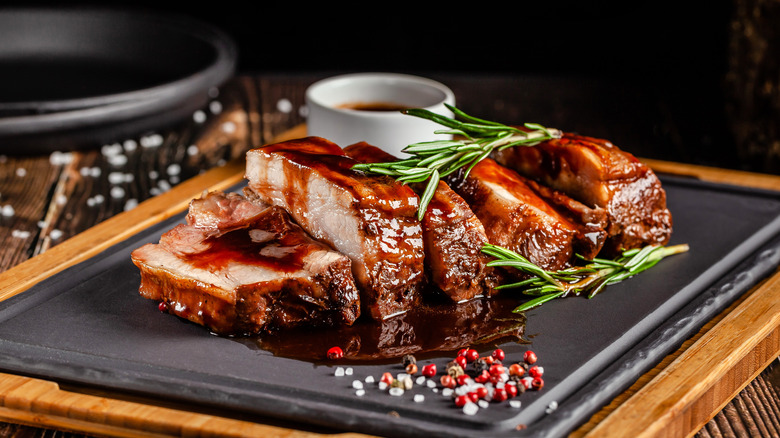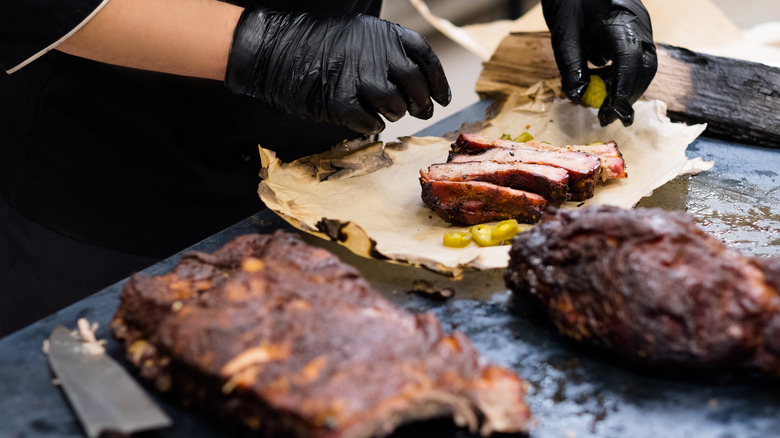Is There A Limit To How Much Smoked Meat You Can Safely Eat?
A juicy smoked brisket or crispy smoked chicken wings can be the perfect choice for family dinners, as long as you don't overindulge. These foods are not necessarily fattening, but they can still harm your health. Processed meats, including smoked meat, have been linked to a higher risk of cancer. One culprit is heme iron, a mineral found in red meat and other animal products, according to the MD Anderson Cancer Center.
Heme iron accounts for 95% of the iron in our bodies, according to a 2014 review published in the journal Nutrients. This compound occurs naturally in meat, whereas non-heme iron is found in nuts, seeds, veggies, and other plant foods. The problem is that dietary heme iron can be toxic when consumed in excess, contributing to diabetes, heart disease, and cancers of the lung, pancreas, colon, and stomach.
Smoked meat also contains dangerous chemicals that form during processing. Additionally, manufacturers add large amounts of sodium and other preservatives to it to make it last longer, which poses further health risks.
What's so bad about smoked meat?
Smoked ostrich steaks and other gourmet foods taste simply amazing and pack a hefty nutritional punch. For example, smoked beef sausages have just 170 calories and more than 6 grams of protein per serving, depending on the ingredients used. The downside is that they also contain high amounts of sodium and saturated fat. Too much salt can damage the heart muscle, increase blood pressure, and contribute to heart attacks.
Cooking meat at high temperatures also promotes the formation of polycyclic amines and other chemicals, says the University of Texas' MD Anderson Cancer Center. These compounds can cause DNA damage and increase cancer risk over time. The same goes for the nitrates and nitrites that are added to smoked meat and fish, notes a 2021 review featured in Food Science and Nutrition.
Smoked foods may also contain zinc, lead, copper, and other heavy metals, according to the researchers. These trace elements have been linked to cancer, kidney disease, digestive disorders, and cardiovascular problems. And if that wasn't bad enough, smoked meats can contain histamine, tyramine, and other compounds with adverse effects that range from high blood pressure to headaches. Another study, which was published in the Journal of the National Cancer Institute in 2017, found that smoked red meat intake can increase the risk of breast cancer and all-cause death. Scientists attribute these adverse effects to the saturated fat and polycyclic amines found in pork, lamb, beef, and other types of smoked red meat.
How much smoked meat is too much?
So, should you cut smoked meat from your diet entirely or just consume less of it? The University of Texas' MD Anderson Cancer Center suggests eating "as little processed meat as possible." Even nitrate-free meats can increase cancer risk, so it's best to avoid them altogether. The World Health Organization supports these claims, saying that the risk of colorectal cancer increases by 18% for every 50 grams of processed meat consumed daily. On a similar note, the UK's National Health Service recommends eating no more than 70 grams (2.4 ounces) of red or processed meat per day.
However, these guidelines aren't set in stone. An occasional serving of smoked meat or fish is unlikely to cause any harm. Gillian Culbertson, a registered dietitian affiliated with the Cleveland Clinic, recommends smoked white meat over red meat. If you prefer the latter, choose leaner cuts, such as smoked sirloin steak. "Lean product is best because most toxic compounds are created by fat dripping onto the heat source," she said to the Cleveland Clinic. Culbertson also advises against eating smoked fish because it often has higher levels of toxins than smoked meat.
You could also get that smoky flavor by using spices and herbs. For example, you can add smoked paprika to grilled or roasted meat to give it that special taste. Alternatively, use chili, cayenne powder, chipotles, or other substitutes for smoked paprika. Culbertson also suggests grilling the meat after marinating it with liquid smoke.


